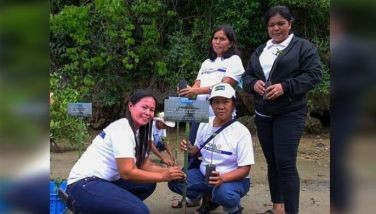Beyond partisan politics

A bespectacled 49-year-old Ronald Llamas, scratching his head, was the most surprised when President Noynoy Aquino announced at the Liberal Party anniversary celebration early this year that Llamas was his choice for presidential political adviser. Llamas had expected a Liberal party member to be chosen. But the President chose him for certain reasons.
Apart from their being close in age (the President is 50, Llamas is turning 50 next month), they were together during the presidential campaign, he serving as key adviser to Aquino and Sen. Mar Roxas. The President must have seen Llamas in action, that he was not the type to go wheeling-dealing just to let his candidates win.
Llamas was quick to answer incredulous references to his ideology. Llamas said, “I am a leftist, but I am not a communist.” He is the founding president of Akbayan Citizens’ Action Party (Akbayan), a registered political party representing marginalized sectors in the country and a coalition party of the LP. The party wants to make reforms in government and society, but through democratic processes. Certainly, it does not attempt to overthrow the government by violent means.
Akbayan, now a party-list group in Congress, welcomed Llamas’ appointment (Llamas is now on leave as party president), saying it was “politically extraordinary if not refreshing in many ways.” It said the choice of “a reputable progressive leader hailing from the democratic left shows that President Aquino can actually go beyond partisan ideological politics and extend its hand of solidarity to forces of change willing and fully committed to meaningfully contribute in the deepening of democracy, the eradication of corruption and the fulfillment of indispensable reforms.”
Prior to his appointment in his current position, President Aquino had appointed Llamas as member of the board of directors of the Development Bank of the Philippines.
Llamas’ activist streak showed itself when he was a journalism student at the University of Santo Tomas. He wrote for campus publications during martial law, but after witnessing a violent demolition of a squatters’ area in Tondo, Manila, he decided to focus on making a difference by writing about the lives and needs of the impoverished and marginalized sectors of society.
In a special issue of The Flame, he wrote the article “Confessions of a Butcher,” a satire about then President Ferdinand Marcos and his defense chief and now Sen. Juan Ponce-Enrile. Consequently the UST administration warned the Varsitarian staff against publishing articles deemed critical of the Marcos regime, compelling Llamas to give up his editorship.
In 1981, he became the first president of the AB Student Council, and wrote the first student constitution in UST, primarily to counteract the meddling of the school administration in student affairs. Other student associations followed suit. Ronald was also instrumental in organizing the Youth for the Advancement of Faith and Justice (YAFJ), an intercollegiate student youth movement that gained prominence and influence in student politics in the university belt area.
Agreeing to open himself up to scrutiny, he had dinner with us girls at XO, a new, cozy restaurant on Valero Street, Makati. We had sopa de mariscos, crispy tadyang, kare-kare, Spanish tapas, mellow wines, and excellent sans rival. He could hardly eat, what with our unending nosy questions. He volunteered that he makes “good adobo,” with coconut milk, lots of garlic, no soy sauce but patis, and with the fat clearly coming out.
After graduation, he went into organizing labor unions and cooperatives. Over the years, he has developed insights that made him credible as a consultant and adviser on government and civil society networks, from local to national governance, agrarian reform, rural development, labor, national economy and public finance. He enthusiastically talked about helping organize a cooperative in Basilan City in which Muslims and Christians and indigenous groups successfully managed a rubber plantation, showing that people of different political colors can work together peacefully.
His exposure in Mindanao has likely given him ammunition in assessing the chances for success of the peace negotiations. He treads gingerly on the question of the government’s giving in to the demands of the Moro Islamic Liberation Front. On the demand for a “substate,” he said reforms must first be carried out within the Autonomous Region in Muslim Mindanao and the different Muslim communities. Federalism is not feasible, he said.
He said he is no political animal, which is just fine with his boss, whom Llamas respects for thinking “out-of-the-box,” being “sincere “ like his mother (the late President Corazon Aquino), not welcoming unsolicited advice, and making decisions not on what is politically expedient, but on gut feel.
He said he “occasionally carries bad tidings.” He tells his boss, “Pwede ba, huwag kang sagot ng sagot” when the media bombard him with questions. But his boss is “no politician, he is so spontaneous.” On the question of his having purchased a Porsche, others would have evaded the question, but his boss said, “But it’s my money.” But the public is watching what you do with your money because you are the president, Llamas told him. His boss decided to sell the sports car.
The President obviously listens to Llamas. Now we see why he chose him to be his political affairs adviser.
* * *
This development rarely happens, and the public must know about it. This has something to do with Filipinos in Spain writing President Aquino to inform him of the blessing that former Consul General Eduardo Jose A. de Vega has been to the Philippines.
The first of two letters, signed by officers of Filipino organizations in Barcelona, Spain, said, “We Filipinos have experienced and are all eyewitnesses of a distinct and transformed notion of public service.” Con-Gen de Vegas’ leadership, the officers said, “approximated a government of, for, and by the people.” During his tenure, he was approachable, and always smiling, thus erasing some of the OFWs’ loneliness living in a foreign land.
The Con-Gen made possible several things: 1) the marking of the site where the Filipino newspaper, La Solidaridad, was published; 2) the recognition of Sala Jose Rizal at Montjuie Castle, where Rizal was temporarily imprisoned in 1896, and 3) his donation of three pairs of giant Philippine shells which now adorn the front of the edifice housing the La Sagrada Familia, the world-famous masterpiece of the great Catalan architect Antonio Gaudi. The donation was timely as it was made just before the blessing and proclamation of the edifice as a basilica by Pope Benedict XVI in November 7 last year.
The second letter sent to President Aquino, dated June 17, 2011, was written and signed by Isabel Adriatico Arruejo, founding president of Timpuyog ti Ilocano-Barcelona (TTIB), which was founded on May 1, 2009, and, with a membership of 300 Ilocanos, is considered the largest Filipino organization in the city. Arruejo thanked the President “for providing us such a community-oriented, hard-working and well-respected diplomat in the person of Consul Gen. de Vega.” Arruejo expressed the sentiment of her kababayans, i.e., that the diplomat be allowed to keep his post in Spain.
But De Vega, 44, has now been assigned as Deputy Chief of Mission to the United Nations with the rank of ambassador.
He is the son of the late Executive Secretary Guillermo de Vega, and former censorship board head Chuchi de Vega.
* * *
My e-mail: dominimt2000@yahoo.com
- Latest
- Trending
























